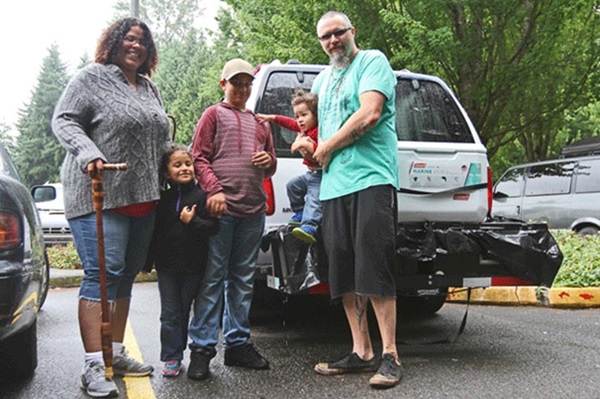On April 5, Jen pulled her leaking 1998 station wagon into a church parking lot. Three years earlier, she had lost her human resources job. Unable to land another one, she eventually had been evicted from her apartment. Living out of her car ever since, the 41-year-old can't remember how she heard about the church, but calls it a blessing that she did.
The church she's referring to is Lake Washington United Methodist Church in Kirkland, Washington. It launched the Safe Parking program in 2011 to give homeless women and families a safe place to park and sleep overnight. It now also provides them with 24-hour parking and access to the church's bathrooms and kitchen. The church lends out laptops for guests to use its Wi-Fi to apply for jobs or seek additional support services.
And when it's really cold outside, guests sleep in the sanctuary.
"People living in vehicles are getting woken up late at night by police officers telling them to move their cars, getting ticketed, or getting their cars booted," says Karina O'Malley, coordinator of Safe Parking.
"People need a safe place to park, and we have a parking lot that can hold about 100 cars."
The Safe Parking program especially benefits women and families because women feel safer sleeping in a parking lot occupied by other women, says O'Malley. Some women in the program say it brings a sense of sisterhood and unity.
In the spring, tech giant Amazon, headquartered nearby in Seattle, announced plans to build a homeless shelter with enough space for 65 families. Seattle City Councilmember Mike O'Brien is working on legislation that would ease parking restrictions for those living in their cars. O'Brien also plans to create dozens of RV "safe lots" throughout the city.
Overnight parking initiatives to help people living out of their cars face criticism from those who believe that safe lots are poor alternatives to housing. As grateful as Jen is for the Safe Parking program, she'd rather live somewhere where she can take a shower.
Contrary to the stereotypes that are associated with homeless people, many of those in the program have jobs and/or are in school, says O'Malley, who credits the skyrocketing housing prices for the county's homelessness crisis. The Seattle Times reported in March that rents in Seattle have gone up 57 percent in the past six years.
While most families usually stay for four to six months, some have been living in the LWUMC parking lot for more than three years. Jen is working with employment agencies to find a job and hopes to be in her own place soon.
"It's time for a change," she says. "I just want peace and to be safe."
Although O'Malley agrees that more shelters are needed and are preferable to safe parking, she sees the program at LWUMC as one piece of a larger system of care.
"We're using the resources we have to help those in need," she says.
J. Gabriel Ware, solutions reporter, YES! Magazine.
One of seven apportioned giving opportunities of The United Methodist Church, the World Service Fund is the financial lifeline to a long list of Christian mission and ministry throughout the denomination. Through the Four Areas of Focus churches are engaging in ministry with the poor which encourages them to be in ministry with their communities in ways that are transformative.





